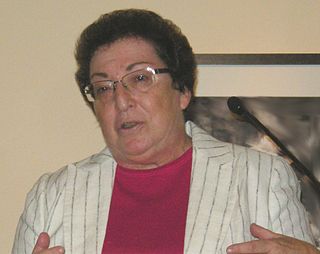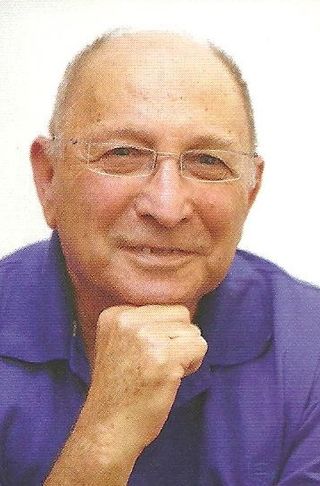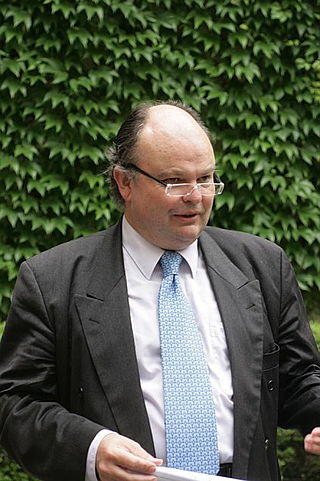Related Research Articles
Disability is the experience of any condition that makes it more difficult for a person to do certain activities or have equitable access within a given society. Disabilities may be cognitive, developmental, intellectual, mental, physical, sensory, or a combination of multiple factors. Disabilities can be present from birth or can be acquired during a person's lifetime. Historically, disabilities have only been recognized based on a narrow set of criteria—however, disabilities are not binary and can be present in unique characteristics depending on the individual. A disability may be readily visible, or invisible in nature.
Queer theory is a field of post-structuralist critical theory that emerged in the early 1990s out of queer studies and women's studies. The term "queer theory" is broadly associated with the study and theorization of gender and sexual practices that exist outside of heterosexuality, and which challenge the notion that heterosexuality is what is normal. Following social constructivist developments in sociology, queer theorists are often critical of what they consider essentialist views of sexuality and gender. Instead, they study those concepts as social and cultural phenomena, often through an analysis of the categories, binaries, and language in which they are said to be portrayed.

In sociology, a peer group is both a social group and a primary group of people who have similar interests (homophily), age, background, or social status. Members of peer groups are likely to influence each others' beliefs and behaviour.
Critical international relations theory is a diverse set of schools of thought in international relations (IR) that have criticized the theoretical, meta-theoretical and/or political status quo, both in IR theory and in international politics more broadly – from positivist as well as postpositivist positions. Positivist critiques include Marxist and neo-Marxist approaches and certain ("conventional") strands of social constructivism. Postpositivist critiques include poststructuralist, postcolonial, "critical" constructivist, critical theory, neo-Gramscian, most feminist, and some English School approaches, as well as non-Weberian historical sociology, "international political sociology", "critical geopolitics", and the so-called "new materialism". All of these latter approaches differ from both realism and liberalism in their epistemological and ontological premises.

Lee Marrs is an American cartoonist and animator, and one of the first female underground comix creators. She is best known for her comic book series The Further Fattening Adventures of Pudge, Girl Blimp, which lasted from 1973 to 1977.

Naomi Chazan is an Israeli academic, activist, and politician. As a legislator, Chazan championed the causes of human rights, women's rights, and consumer protection. Chazan is a past president of the New Israel Fund.
Valentine Moghadam is a feminist scholar, sociologist, activist, and author whose work focuses on women in development, globalization, feminist networks, and female employment in the Middle East.

Military sociology is a subfield within sociology. It corresponds closely to C. Wright Mills's summons to connect the individual world to broader social structures. Military sociology aims toward the systematic study of the military as a social group rather than as a military organization. This highly specialized sub-discipline examines issues related to service personnel as a distinct group with coerced collective action based on shared interests linked to survival in vocation and combat, with purposes and values that are more defined and narrow than within civil society. Military sociology also concerns civil-military relations and interactions between other groups or governmental agencies.
Paula Claire Rodriguez Rust is an American sociologist who studies sexual orientation, especially bisexuality. Rust is editor of Bisexuality in the United States and author of Bisexuality and the Challenge to Lesbian Politics: Sex, Loyalty, and Revolution.

Haggai Erlich is professor emeritus at Tel Aviv University and an academic adviser at the Open University of Israel where he is the head of Middle Eastern History studies. He is the Landau Prize recipient for 2010 in African Studies.
Wayne Cornelius is a U.S. scholar of comparative immigration policy and Mexican politics and development. He received his B.A. in Political Science from the College of Wooster in Wooster, Ohio in 1967. Cornelius founded the Center for U.S.-Mexican Studies at the University of California, San Diego in 1979, and directed it from 1979–1994 and 2001-2003. He was also the founding director of UCSD's Center for Comparative Immigration Studies, established in 1999. Cornelius is also a Past President of the Latin American Studies Association. Cornelius has also been a Research Fellow of the Institute for the Study of Labor, the Woodrow Wilson International Center for Scholars, and a member of the Council on Foreign Relations.

Wolfgang Franz Danspeckgruber is the Founding Director of the Liechtenstein Institute on Self-Determination at Princeton University and has been teaching on issues of state, international security, self-determination, diplomacy, and crisis diplomacy at Princeton's Woodrow Wilson School of Public and International Affairs and the Department of Politics since 1988. He is also founder and chair of the Liechtenstein Colloquium on European and International Affairs, LCM, a private diplomacy forum.
The representation of disability in children's literature is a matter of scholarly research, and has been a relevant subject particularly since the 1970s. However, disability representation is still a modern issue. A 2011 World Report on Disability conducted by the World Health Organization found that around 15% of the global population, 1 billion people, have a disability, yet in 2019 only 3.4% of children's books had disabled main characters. The quality of disability representation can vary depending on the specific disability portrayed. Even though society has included more diverse characters with disabilities, this representation must be handled with care to avoid promoting existing negative stereotypes.

A critical theory is any approach to humanities and social philosophy that focuses on society and culture to attempt to reveal, critique, and challenge or dismantle power structures. With roots in sociology and literary criticism, it argues that social problems stem more from social structures and cultural assumptions than from individuals. Some hold it to be an ideology, others argue that ideology is the principal obstacle to human liberation. Critical theory finds applications in various fields of study, including psychoanalysis, film theory, literary theory, cultural studies, history, communication theory, philosophy, and feminist theory.
Leslie Jane Irvine is an American sociologist specializing in conceptions of the self and human-animal relationships. She is currently a professor in the Department of Sociology at the University of Colorado Boulder, where she has worked since 1998. Her methodological specializations include qualitative research and narrative analysis. Born and raised in Buffalo, New York, she attended Palm Beach Junior College, Florida Atlantic University and State University of New York at Stony Brook.
Fred L. Pincus is an American sociologist and emeritus professor of sociology at the University of Maryland—Baltimore County, where he taught for 44 years. He is known for researching claims of reverse discrimination by whites and males in the United States.
Bernd Reiter is a political scientist and professor at Texas Tech University. He formerly served as the Director of the Institute for The Study of Latin American and the Caribbean (ISLAC) and professor of political science for the School of Interdisciplinary Global Studies at the University of South Florida. His research focuses on democracy, race and decolonization. Reiter is a decolonization scholar and has collaborated with such authors as Arturo Escobar (anthropologist), Sandra Harding, Raewyn Connell, Catherine Walsh, Gustavo Esteva, Walter Mignolo, and Aram Ziai. He has also made contributions to Critical Whiteness Studies. In 2017, he gave a TEDx talk on The Crisis of Liberal Democracy and the Path Ahead.
Eva Kahana is an American sociologist.
Ruth Hege Howes is an American nuclear physicist, expert on nuclear weapons, and historian of science, known for her books on women in physics.
Tanis Doe was a Métis academic, and activist. She worked as a professor at several institutions across the United States and Canada. She was known for her research on participatory action, and worked covering topics in the categories of disability, abuse, genders, sexualities, employment, assistive technology, and advocacy.
References
- ↑ Disability and Identity: Negotiating Self in a Changing Society Rosalyn Benjamin Darling. Lynne Rienner Publishers. Retrieved 3 November 2015.
- ↑ OCLC 10421500